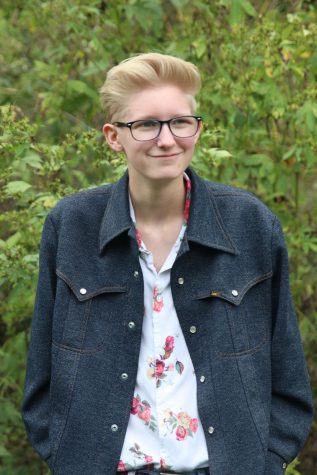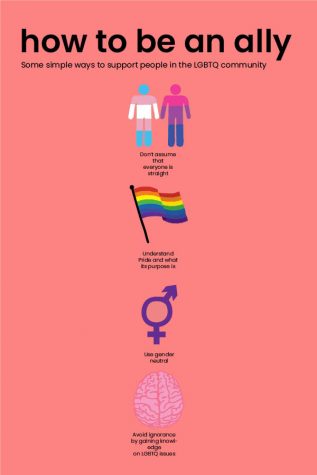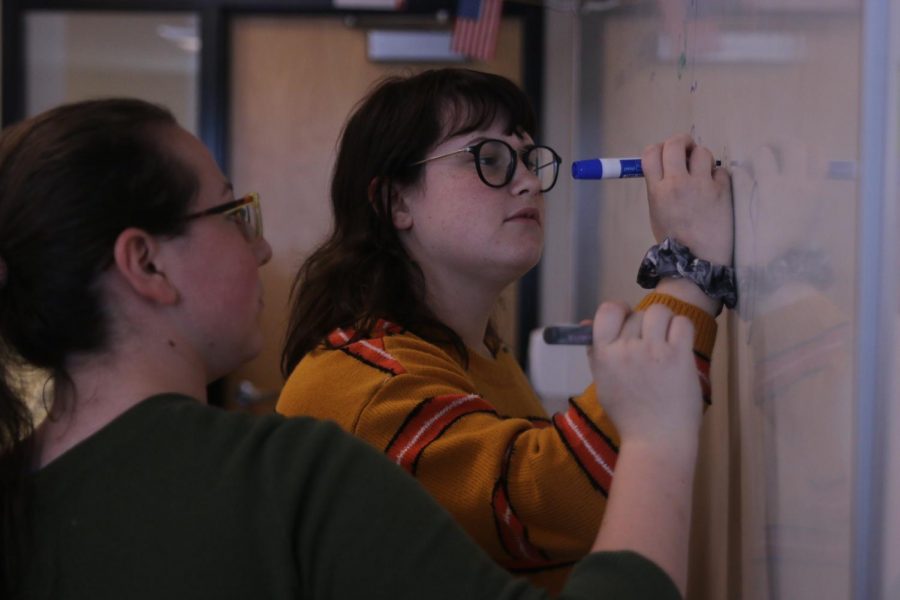Writing on the whiteboard, junior Madelyn Augustine and senior Madelynn Hodes draw the agenda for the GSA meeting on Tuesday, Oct. 9.
In Mill Valley
A classroom right before passing period can reveal a lot about the treatment of LGBTQ students at the school. Pro-LGBTQ stickers cover the laptops and water bottles of some students, while simultaneously other students jokingly use anti-gay slurs to mock each other.
This scene is a microcosm of the treatment of LGBTQ people at Mill Valley. Some corners of the school are teeming with acceptance and kindness towards every student regardless of their identity, while others feature derogatory language and disdain for students whose identity does not match their own.
Transgender senior Park Zebley thinks a majority of the student population fits into the kind and accepting category.
“Generally, the student population was pretty good with it,” Zebley said. “It was really just dealing with adults which was difficult, which was surprising to me.”

Without access to a nearby bathroom that suits his needs, senior Park Zebley believes that the school’s bathroom policy is inconvenient for transgender students.
He believes that the reason some adults are less accepting than the student body is because of tradition and lack of knowledge.
“[Adults are] used to how things are, and a lot of adults and administrative positions aren’t really trained on how to make everybody as comfortable as possible,” Zebley said.
Some adults are working to break their stereotype of intolerance. Health teacher Amy McClure makes it a point of emphasis in her classroom that LGBTQ students are accepted and derogatory slurs are not.
“I don’t tolerate [slurs],” McClure said. “I always tell kids, if you’re referring to a math test, your math test is not gay. Your math test doesn’t have sexual orientation. Don’t use that term in a negative way.”
Bisexual junior Madelyn Augustine has a more cynical view of students. She believes that if students felt comfortable harassing her, they would; however, they’re afraid to make derogatory remarks at school.
“I don’t think people have the courage or the guts or even the second thought to say anything mean to me,” Augustine said.
The district attempted to institutionalize an atmosphere of tolerance by adding sexual orientation to the district’s non-discrimination policy last spring. While superintendent Frank Harwood is glad the policy was passed, he’s also thankful that it hasn’t been needed thus far.
“In day to day things, [the non-discrimination policy] doesn’t make any difference. What it does is make our policy more inclusive,” Harwood said. “We want to make sure that [LGBTQ students] feel like [they’re] included.”
However, there are still a few areas where LGBTQ students aren’t equal. One of the most visible is bathroom use. According to Harwood, transgender students are not forced to use a bathroom that doesn’t match their gender identity, but they are also not allowed to use bathrooms corresponding with their chosen gender.

Due to this rule, only the four unisex bathrooms in the school are available to transgender students. One, located by the art room, is only accessible with a key that must be obtained from an art teacher. Two, located in the nurse’s office and the main office, require permission from either the nurse or office staff to use. Zebley is primarily limited to only one bathroom, located in the library.
“I’m just left with [one bathroom] during the day, which can be frustrating if I need to get to classes and get things from my locker as well,” Zebley said.
Zebley thinks that while there is still progress to be made, the school is very tolerant compared to other places in society.
“We’re pretty lucky here. Obviously, there’s still some people that are just ignorant or trying to get a reaction. But in the circles I’m in it’s all really, really good. Most people don’t even really care.”
